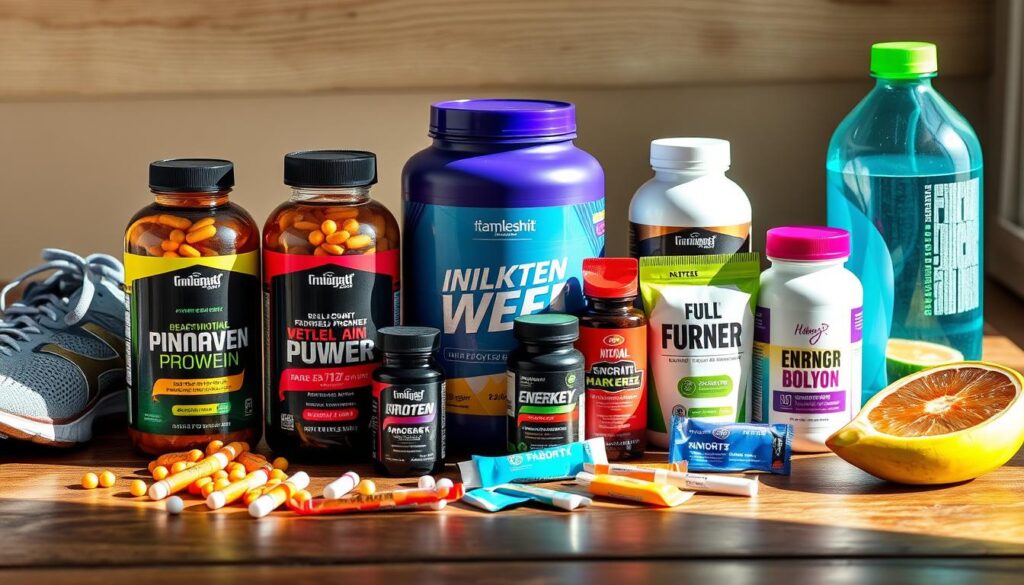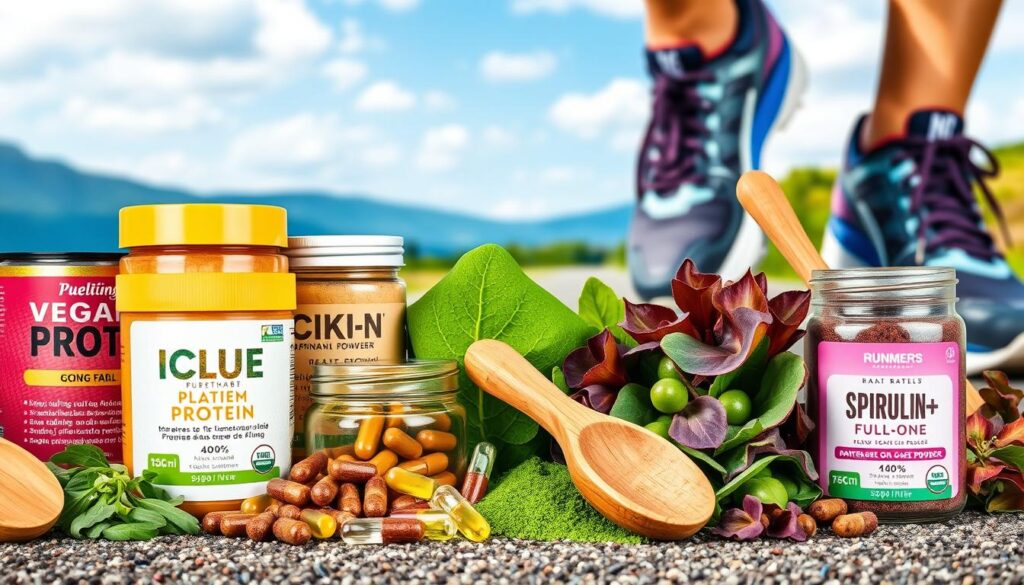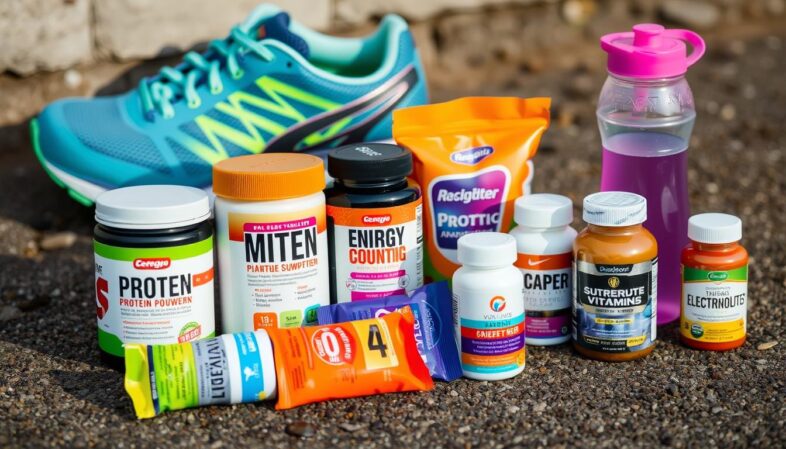As a runner, you know that eating right is crucial. A diet full of fruits, veggies, whole grains, lean meats, and legumes is great. But runners need more nutrients. That's where supplements come in, helping to fill those gaps and boost performance.
For runners, some top supplements include multivitamins, iron, omega-3s, vitamin D, and protein powders. These natural aids help make sure you get all the vitamins and minerals you need for an active life.
Remember, supplements are just a help, not a replacement for a healthy diet. Food should always be your main source of nutrients. Supplements are meant to add to your diet, not take its place.
Key Takeaways:
- A balanced diet is the foundation of proper runner nutrition
- Running supplements can help fill nutrient gaps and optimize performance
- Multivitamins, iron, omega-3 fatty acids, vitamin D, and protein powders are among the best supplements for runners
- Natural supplements for runners should complement a healthy diet, not replace it
- Consult with a healthcare professional before starting any new supplement regimen
The Importance of Proper Nutrition for Runners
A well-balanced runner diet is key for top performance and recovery. It should include carbs, lean proteins, healthy fats, and vitamins and minerals. Carbs are vital for fueling running, giving the energy for long runs and hard workouts.
Recent stats show 81% of runners use supplements for nutrition. The most common supplements are:
| Supplement | Percentage of Runners |
|---|---|
| Protein Powder | 65% |
| Multivitamins | 57% |
| Omega-3 Fatty Acids | 47% |
| Iron | 35% |
| Vitamin D | 29% |
It takes about 500g of carbs to fill a runner's glycogen stores. These last 60-90 minutes of running. For longer runs, aim to eat 30-60g of carbs per hour for the first three hours. Then, increase to 60-90g per hour.
Staying hydrated is also key for runners. Losing just 1% of body weight through sweat can hurt performance. Most electrolyte tablets or sports drinks have 250-300mg of sodium. Some runners might need more sodium based on their sweat rate.
“Fueling correctly is just as important as training. A well-planned nutrition strategy can lead to better performance, faster recovery, and reduced risk of injuries.”
By focusing on a balanced runner diet and staying hydrated, runners can improve their performance. They also support muscle recovery and keep their health in check. Proper nutrition for runners is vital for any successful training program. It ensures the body has the fuel and nutrients to excel in running.
Check Current PricesEssential Vitamins and Minerals for Runners
Runners need many vitamins and minerals to stay healthy and perform well. These nutrients help with energy, muscle function, bone health, and fighting off sickness. Even with a good diet, some runners use supplements to get enough.

Nature Made® is the top choice for vitamins and supplements, including for runners. Their Vitamin D3 softgels support bones and immune health. Their Iron Gummies with Vitamin C help make red blood cells.
Vitamin A
Vitamin A keeps skin and eyes healthy. Runners can get it from foods like sweet potatoes, carrots, and spinach.
B Vitamins
B vitamins, like B12, are key for energy and cell work. Nature Made® offers B12 softgels to help runners use food for energy.
Vitamin C
Vitamin C fights off sickness and helps iron absorption. Good sources include citrus fruits, berries, and leafy greens.
Vitamin D
Vitamin D is important for bones and immune health. Runners can get it from the sun or supplements like Nature Made® Vitamin D3 softgels.
Calcium
Calcium is crucial for bones and teeth. Runners can get it from dairy, greens, and Nature Made® Calcium with Vitamin D3 Tablets.
Iron
Iron is key for carrying oxygen and making red blood cells. Female runners might need more iron. Good sources include lean meat, fish, lentils, and spinach. Nature Made® Iron Gummies with Vitamin C can help.
Magnesium
Magnesium helps muscles relax and keeps the heart healthy. Nature Made® High Absorption Magnesium Citrate Gummies make it easy for runners to get this mineral.
Potassium
Potassium is good for the heart and muscles. Runners can find it in bananas, potatoes, and avocados. Nature Made® Potassium Gluconate Tablets are also a good option.
Zinc
Zinc is important for the immune system and energy. Runners can get zinc from lean meats, seafood, and legumes. Zinc lozenges or tablets can also help.
“As a runner, I know how important it is to fuel my body with the right nutrients. I trust Nature Made® supplements to help me meet my vitamin and mineral needs and keep me performing at my best.” – Sarah, marathon runner
While supplements can help, they shouldn't replace a healthy diet and lifestyle. Always talk to a doctor before starting any new supplements.
Check Current PricesProtein Supplements for Muscle Recovery and Growth
For runners, protein is key for muscle repair and growth. Running is tough, so athletes need more protein than regular people. Adding protein supplements to their diet helps runners recover better after workouts.
Runners have many protein supplement choices. Whey protein is a top pick because it's easy for the body to absorb. It comes from milk and has all the amino acids needed for muscles to heal and grow. For example, Optimum Nutrition Gold Standard 100% Whey Protein Powder gives 24g of protein per serving.
Whey Protein
AGN Roots Grass Fed Whey Protein Powder is a great whey protein for runners. It has 25g of protein per serving, from grass-fed cows in Ireland. It's now 20% off on Amazon, priced at $56.
Plant-Based Protein Options
Vegan and vegetarian runners have plant-based protein options. These blends use peas, brown rice, hemp, and chia seeds for a full amino acid profile. Garden of Life Organic Vegan Sport Protein Powder is a favorite, offering 30g of protein per serving. It's 26% off at Amazon, priced at $41.
| Protein Powder | Protein per Serving | Price |
|---|---|---|
| Garden of Life Organic Vegan Sport Protein Powder | 30g | $41 (26% off on Amazon) |
| Optimum Nutrition Gold Standard 100% Whey Protein Powder | 24g | $29 (31% off on Amazon) |
| Ritual 18+ Vegan Protein Powder | 20g | $34 (30% off on Amazon) |
| AGN Roots Grass Fed Whey Protein Powder | 25g | $56 (20% off on Amazon) |
| Bob's Red Mill Almond Protein Powder | N/A (unflavored) | $14 (available at Walmart) |
When picking a plant-based protein powder for runners, look at the protein sources. Soy protein is common, but the US often uses genetically modified soy. Non-GMO soy is rare and expensive. Rice protein, treated with enzymes, is a better choice for vegans or vegetarians.
Using recovery protein supplements after workouts helps muscles recover and grow. By adding these supplements to their diet, runners meet their protein needs and boost their athletic performance.
Omega-3 Fatty Acids for Inflammation Reduction and Joint Health
Omega-3 fatty acids, like EPA and DHA, are key for runners. They help reduce inflammation, improve joint health, and support heart function. You can get them from fatty fish or take supplements like fish oil or algae-based options for those who don't eat meat.
Research shows most athletes don't eat enough fish or seafood. They also don't get enough EPA and DHA. The American diet has too much omega-6 and not enough omega-3, which is not good for health.
There's no official daily amount for omega-3s, but experts suggest different amounts. For example, the Canadian Association of Nutrition recommends 0.5g of EPA and DHA daily.
- Canadian Association of Nutrition and Dietetics: 0.5g of EPA and DHA combined daily
- European Food Safety Authority: 0.25g of EPA and DHA daily
- American Heart Association: 1g of EPA and DHA per day for those with coronary heart disease, and 2-4g for those with elevated triglycerides
Runners need 0.5g to 2g of EPA and DHA daily, depending on their activity level. Eating oily fish like salmon twice a week is a good start. Plant-based foods like chia seeds and walnuts also have omega-3s, but they're harder for the body to use.
For those who can't get enough from food, omega-3 supplements for runners are a good choice. Aim for 0.5g to 2g of EPA and DHA each day. Choose a supplement with a five-star rating from the International Fish Oil Standards to ensure quality.
“Dosages of 1.5-2.0g/day have been shown to improve endurance capacity and reduce delayed onset muscle soreness in athletes.”
Many athletes don't get enough omega-3s, which can harm their performance. By eating foods rich in omega-3s or taking supplements, runners can improve their joint health and reduce inflammation. This helps them perform better.
Antioxidants for Improved Recovery and Immune Function
Running hard can cause stress and inflammation in the body. This can slow down recovery and weaken the immune system. Supplements like vitamin E and selenium can help fight these effects and keep you healthy.
Studies show that even a little bit of exercise can reduce the risk of infections by 10 percent. But, marathon runners often get sick with upper respiratory infections soon after finishing a race. This shows how exercise can affect the immune system.
Vitamin E
Vitamin E is a strong antioxidant that keeps skin healthy and boosts the immune system. It's also good for runners at high altitudes. You can get vitamin E from nuts, seeds, and whole grains. Or, you might want to take a supplement to make sure you get enough.
Selenium
Selenium is another key antioxidant that helps the thyroid and metabolism. It works with vitamin E to protect cells from damage. You can get enough selenium from foods like Brazil nuts, seafood, and whole grains.
While supplements can help runners, too much of some antioxidants can be bad. For example, too much vitamin C can hurt sports performance. But, eating fruits and veggies with up to 250 mg of vitamin C daily can help without harming training.
What Supplements Should Runners Take – A Comprehensive List
As a runner, you know that proper nutrition is key for top performance and recovery. A balanced diet is the base of good health. But, supplements can offer extra support to help you meet your running goals. Here are some important supplements for runners to think about:

Multivitamins are a good start, filling in any diet gaps. Choose a high-quality multivitamin with vitamins A, B, C, D, and minerals like calcium, iron, magnesium, potassium, and zinc. These nutrients are vital for energy, bone health, and muscle function.
Omega-3 fatty acids in fish oil supplements are key for less inflammation and joint health. Studies show that 1.5-2.0g/day of EPA and DHA can boost endurance and reduce muscle soreness.
Protein supplements, like whey or plant-based powders, help with muscle recovery and growth. Taking protein after a workout aids in muscle repair and glycogen replenishment. When picking a protein supplement, look for third-party tested products for quality and purity.
- Antioxidants like vitamin E and selenium fight oxidative stress and boost immune function.
- Performance-enhancing supplements like caffeine, beta-alanine, and creatine can give a boost during hard training.
- Electrolyte supplements are crucial for keeping hydrated and preventing muscle cramps, mainly during long runs or in hot weather.
“Marathon runners can benefit from supplements like recovery protein, hydration electrolyte tablets, MegaMag Muscleze, omega-3, vitamin B, vitamin D, and calcium to support their training and recovery.”
Remember, supplements should not replace a balanced diet and proper training. Always talk to a healthcare professional before starting any supplements to ensure safety and right dosages. With the right mix of nutrition, training, and essential supplements for runners, you'll be on your way to reaching your running goals.
Check Current PricesSupplements for Endurance and Performance Enhancement
Running is a tough sport that needs physical strength and endurance. Many runners use supplements to push their limits and reach their goals. Let's explore some top performance supplements for runners that boost endurance and performance.
Caffeine
Caffeine is a well-known stimulant that boosts focus, reduces fatigue, and enhances endurance. Studies show it helps in sports like cycling, cross-country skiing, and running. But, how caffeine affects you can vary based on your genetics.
Beta-Alanine
Beta-alanine is an amino acid that raises muscle carnosine levels. This leads to better endurance and less fatigue. A study found runners who took beta-alanine for 28 days ran longer than those who didn't. Beta-alanine is a top endurance supplement for runners.
Creatine
While creatine is often linked with strength training, it also boosts high-intensity exercise in runners. It helps produce ATP, key for muscle contractions. Talk to a sports dietitian to see if creatine, at 3-5g per day, can help your endurance.
| Supplement | Benefits | Recommended Dosage |
|---|---|---|
| Caffeine | Improves focus, reduces fatigue, boosts endurance | 3-6 mg/kg body weight, 1 hour before exercise |
| Beta-Alanine | Increases muscle carnosine, improves endurance, reduces fatigue | 4-6 g/day, divided into smaller doses |
| Creatine | Enhances ATP production, improves high-intensity performance | 3-5 g/day, consult with a sports dietitian |
Endurance athletes should eat 1.7-2.2g/kg of body weight of protein to meet training demands.
For endurance runners, staying hydrated and balancing electrolytes is key. Losing 1000mg of sodium per 1 L of sweat during exercise shows the need for electrolyte replenishment. Water and electrolytes help with fluid balance, nerve function, and muscle contractions, crucial for long runs or in hot weather.
Supplements for Vegetarian and Vegan Runners
Vegan and vegetarian runners face special nutritional challenges. They need to pay extra attention to iron, vitamin B12, and omega-3 fatty acids. Luckily, there are many vegan and plant-based supplements to help meet these needs.

Iron is key for athletes, but it's hard to get enough from plants. Iron helps carry oxygen and energy. Vegan runners might need iron supplements to avoid feeling tired and weak.
Vitamin B12 is another challenge for vegan runners. It's mainly found in animal products. The Academy of Nutrition and Dietetics suggests vegans take a 250 mcg B12 supplement daily. This helps prevent anemia and its symptoms like extreme tiredness.
| Nutrient | Recommended Daily Intake | Plant-Based Sources |
|---|---|---|
| Vitamin D | 15 mcg or 600 IU | Fortified foods, sunlight exposure |
| Vitamin B12 | 2.4 mcg | Fortified foods, supplements |
| Omega-3 Fatty Acids (DHA and EPA) | 250-500 mg combined DHA and EPA | Algae-based supplements |
Omega-3 fatty acids are vital for reducing inflammation and joint health. They're usually found in fish and algae. Vegan runners can use algae-based supplements to get enough omega-3s and recover better after exercise.
“As a vegan runner, I've found that paying close attention to my nutrient intake and using targeted supplements has made a significant difference in my performance and recovery.” – Sarah, marathon runner
Vegan runners should also eat a variety of plant-based proteins. Foods like tofu, quinoa, hemp seeds, and peanuts are good sources. Plant-based protein powders like soy, pea, and hemp can also help meet protein needs.
The Role of Hydration and Electrolytes in Running Performance
Staying hydrated and keeping electrolyte levels balanced are key for runners. When you run, you lose fluids and electrolytes through sweat. This can lead to dehydration and imbalances if not replaced. That's why electrolyte supplements for runners and proper hydration for runners are important.
A study in the Scandinavian Journal of Medicine & Science in Sports found that athletes who took sodium chloride and other electrolytes before and during a half-Ironman race ran faster. Another study in Medicine and Science in Sports and Exercise showed that electrolytes before running help with fluid retention, aiding in rehydration.
The average amounts of electrolytes lost in 315 mL of sweat are:
- Sodium (220 mg)
- Potassium (63 mg)
- Calcium (18 mg)
- Magnesium (8 mg)
To avoid stomach issues or performance drop, athletes should replace 50 to 80 percent of lost electrolytes. Most sports drinks have about 200 milligrams of sodium, which might not be enough for endurance athletes. They might need salt capsules, electrolyte tablets, or enhanced gels instead.
Sodium
Sodium is vital for runners, helping keep fluid balance and preventing hyponatremia. Women in the luteal phase of their menstrual cycle may lose more sodium. It's advised to consume around 700-900mg of electrolytes per litre of fluid during long runs or races.
Potassium
Potassium supports muscle function and prevents cramps. Runners can keep their potassium levels up with a balanced diet or electrolyte supplements. Foods like fruits, vegetables, and whole grains are good sources.
Even a 2% fluid loss during exercise can hurt endurance performance. Runners can lose about 3 pounds of fluid in one hour without drinking anything. To avoid dehydration, they should drink 0.07 to 0.14 ounces of fluid per pound of body weight before exercise. Adjustments should be made based on sweating and the environment.
Just a 2% loss in body weight due to dehydration can impair exercise performance.
Replacing electrolytes after running or racing is key. Cow's milk is a good option because it has carbohydrates, proteins, and electrolytes to aid recovery. By focusing on hydration and electrolyte balance, runners can keep their performance up, avoid cramping and fatigue, and stay healthy.
Supplements for Injury Prevention and Recovery
Running is tough on the body, putting stress on joints and tissues. This increases injury risk. Runners can use specific supplements to help their bodies. These support joint health, reduce inflammation, and aid in recovery.
Glucosamine and chondroitin are popular among runners. Glucosamine helps make connective tissues. Chondroitin keeps these tissues elastic and strong. Together, they may cut down inflammation and boost joint mobility, helping prevent injuries.
Collagen is also important for runners. It's key for connective tissue strength. But, as we age, our body makes less collagen. This makes older athletes more injury-prone. Collagen supplements may help keep connective tissues healthy and lower injury risk.
Supporting Supplements for Injury Prevention
Other supplements can also help runners avoid injuries:
- Vitamin C helps make collagen, strengthening tissues.
- Magnesium is crucial for bone strength, protein making, and muscle movement.
- Zinc is important for healing wounds, repairing tissues, and growth.
- Calcium keeps bones healthy and is key for muscle contractions and nerve signals.
- Vitamin D helps with calcium absorption and can be gotten from sun or supplements.
Omega-3 and omega-6 fatty acids, found in fish, seeds, nuts, and oils, can reduce inflammation. But, runners should be careful with omega-3 supplements after injuries. Too much can slow down muscle recovery.
| Supplement | Benefits for Runners |
|---|---|
| Glucosamine & Chondroitin | Reduce inflammation, improve joint mobility |
| Collagen | Supports connective tissue health, reduces injury risk |
| Vitamin C | Aids in collagen synthesis, strengthens connective tissues |
| Magnesium | Essential for bone strength, protein synthesis, muscle movement |
| Zinc | Vital for wound healing, tissue repair, growth |
| Calcium & Vitamin D | Support bone health, muscle contractions, nerve signaling |
| Omega-3 & Omega-6 Fatty Acids | Reduce inflammation, but use cautiously post-injury |
Research on injury prevention supplements is mixed. Yet, some runners find them helpful for joint health and injury prevention. Always talk to a healthcare professional before starting any new supplements.
Check Current PricesConclusion
Proper nutrition is key for runners to perform well and stay healthy. Supplements can help meet the extra needs of runners. Important supplements include multivitamins, iron, omega-3s, vitamin D, protein powders, and antioxidants.
These supplements fill nutritional gaps, aid in muscle recovery, and boost the immune system. Performance-enhancing supplements like caffeine, beta-alanine, and creatine can give runners an edge. They improve endurance, reduce fatigue, and increase muscle strength.
Vegetarian and vegan runners need to focus on iron, vitamin B12, and omega-3s. These nutrients are often missing in their diets. Keeping hydrated and balanced electrolytes is vital, more so during long races like marathons.
Supplements like glucosamine, chondroitin, and collagen can help with joint health. But, remember, supplements can't replace a balanced diet and proper training. Always talk to a healthcare professional before starting supplements. This way, runners can improve their performance, recovery, and health.
FAQ
What are the most essential supplements for runners?
Runners need multivitamins, iron, omega-3 fatty acids, vitamin D, and protein powders. These help fill nutrient gaps and boost performance.
How can proper nutrition benefit runners?
Good nutrition gives runners energy and helps muscles recover. It keeps them healthy and improves performance. A balanced diet is key.
What vitamins and minerals are crucial for runners?
Runners need vitamins A, B, C, D, and minerals like calcium, iron, magnesium, potassium, and zinc. These support health and energy.
How can protein supplements benefit runners?
Protein is vital for muscle repair and growth. Runners need more protein. Supplements like whey or plant-based options help after workouts.
What are the benefits of omega-3 fatty acids for runners?
Omega-3s fight inflammation, easing muscle soreness and improving joints. Runners can get them from fish or supplements like fish oil or algae.
How can antioxidants support runners' health and performance?
Antioxidants like vitamin E and selenium protect against exercise damage. They keep skin healthy, boost immunity, and support metabolism.
What supplements can enhance endurance and running performance?
Caffeine, beta-alanine, and creatine can boost endurance and performance. They reduce fatigue and improve focus and strength.
What specific supplements should vegetarian and vegan runners consider?
Vegetarian and vegan runners need to focus on iron, vitamin B12, and omega-3s. Consider iron, B12, omega-3 supplements, and plant-based proteins.
Why are hydration and electrolyte balance important for runners?
Hydration and electrolytes are key for performance and health. Sodium and potassium prevent dehydration and support muscles. A balanced diet or sports drinks can help.
What supplements can help with injury prevention and recovery for runners?
Glucosamine, chondroitin, and collagen may aid in injury prevention and recovery. But, consult a healthcare professional before starting any supplements.
Check Current Pricing




